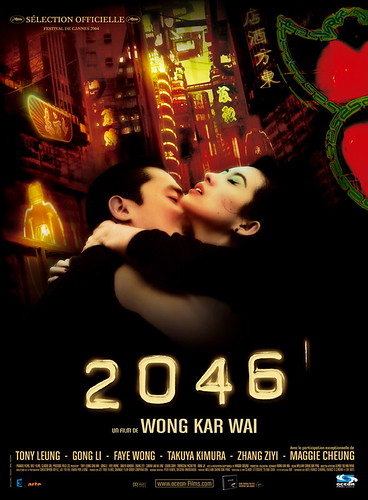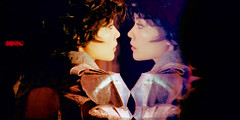It sounds like the sort of movie I take pains to avoid.
A writer in Hong Kong, late 1960s, has a way with women but always seems to meet them at the wrong time, too early or too late. He's a penny-a-liner hack who scratches out a living writing soft pornography, but turns to science fiction and (like, I suppose, every fiction writer who has ever lived) starts to populate his stories with people from his own life, transformed. Even the number of a room -- 2046 -- in the down-at-the-heels hotel he lives in, and where one of his amours takes place, becomes the year in which his fantasy vision is set.
His real-life lovers become, in the fantasy, amalgams of humanity and technology, and he spends part of the movie on a train which carries him back to the '60s, the only person ever to make the return journey. The film cuts between a time that is both recent as history goes but far enough past as to look slightly strange, and an imagined future that is hallucinogenically portrayed.
Ugh -- a recipe for arty pretentiousness. And reading a description like the one above, that's probably what you would surmise.
But in this instance, you'd be mistaken. 2046, just released on DVD, is a work of transfigurational beauty, which saturates the eye yet inspires reflection.
Its most immediate appeal, certainly, is sensuous. The sets are richly painted and lit, compositions are continually striking and make artistic profit from the 2.35-to-1 aspect ratio. (One of the great blessings of DVD is that you almost always get the "letterboxed" view, i.e., see the film in its correct proportions.)
The writer-director, Wong Kar-Wai, and his camera director, Christopher Doyle, don't go in for conventional pretty shots (sunsets, light reflecting on water, etc. — what Stanley Kauffman called "arias for cinematographer"), but rather they appropriate hues and structure for psychological effect. I'm not sure I've seen anything like this since Antonioni and Fellini started shooting in color. Movie scenes set in a high-tech future usually bore me, because they seem like everyday life now only more so, but those in 2046 are as enthralling as the other, "retro" scenes.
The musical score is all over the place, everything from opera to Nat King Cole, and should be a disaster. But Wong's taste and sense of appropriateness make the sound track further enhance the moods.
The acting, by Hong Kong-based players, is remarkably powerful and subtle. Practically any actor with some technical training can convincingly portray a single emotion, but only deeper resources can project simultaneous, multiple feelings. The key actors here do that.
Tony Leung Chiu-wai, as the writer, gives us a character who is somewhat flippant and feckless, whose behavior is often callous, but you eventually understand the defenses he's built up against loss and loneliness. And I have never heard the Chinese language spoken so melodiously as he does here. There is a tiny class of actors whose voices, as such, command absorption -- John Gielgud and Ralph Richardson, or of more recent generations, Michael Gambon and Jeremy Brett. Leung is in their company.
The women who move in and out of his present life and in at least one case (maybe more) populate his daydream/fiction of the future — Ziyi Zhang, Faye Wong, Gong Li (the first two previously unknown to me) — also offer crisp, layered performances.
In other ways, 2046 doesn't give up its secrets easily. I didn't "get" some of the story line and psychological complexities on a first viewing: with so much to beguile the eye, and so much that is imaginative about the direction, only by watching the film again did I feel like I was beginning to comprehend its various dimensions.
What is this film "about"? You could say that its theme is trying to recapture lost time, à la Proust, and I think that would be true; or looking for escape from a broken world to be made whole in fantasy, only to find that even fantasy teases and withdraws its favors, and that might also be true. I suspect other discoveries lie in wait as well. But I don't want to give the impression that 2046 is a film you have to "work" at to "interpret." Part of its power and charm is that it unfolds like a flower if you leave yourself open to it.
I ended this posting's title with a question mark because I don't know if 2046 is the first great film of the new millennium — I haven't seen everything that's been released, obviously — but it's the first I'm aware of. "Great" doesn't mean perfect. There are a few scenes that don't especially come off, and one or two of the character-actor parts could have been better cast. None of that is bothersome for long.
Interesting, too, that the picture comes from China, and that it contains nothing folkish or technically primitive; if you have a totally legitimate fear of pinched, dreary "art house cinema," be assured that 2046 is no such thing. But unlike practically any current American, British, or European film, it feels authentically humane. Why can't we make movies this elegant and moving? It seems we, amid our freedom and wealth, must re-learn the art from practitioners working in a politically repressive society that has no voice but a cry from the mind and an intellect tuned in to the heart.
A writer in Hong Kong, late 1960s, has a way with women but always seems to meet them at the wrong time, too early or too late. He's a penny-a-liner hack who scratches out a living writing soft pornography, but turns to science fiction and (like, I suppose, every fiction writer who has ever lived) starts to populate his stories with people from his own life, transformed. Even the number of a room -- 2046 -- in the down-at-the-heels hotel he lives in, and where one of his amours takes place, becomes the year in which his fantasy vision is set.
His real-life lovers become, in the fantasy, amalgams of humanity and technology, and he spends part of the movie on a train which carries him back to the '60s, the only person ever to make the return journey. The film cuts between a time that is both recent as history goes but far enough past as to look slightly strange, and an imagined future that is hallucinogenically portrayed.
Ugh -- a recipe for arty pretentiousness. And reading a description like the one above, that's probably what you would surmise.
But in this instance, you'd be mistaken. 2046, just released on DVD, is a work of transfigurational beauty, which saturates the eye yet inspires reflection.
Its most immediate appeal, certainly, is sensuous. The sets are richly painted and lit, compositions are continually striking and make artistic profit from the 2.35-to-1 aspect ratio. (One of the great blessings of DVD is that you almost always get the "letterboxed" view, i.e., see the film in its correct proportions.)
The writer-director, Wong Kar-Wai, and his camera director, Christopher Doyle, don't go in for conventional pretty shots (sunsets, light reflecting on water, etc. — what Stanley Kauffman called "arias for cinematographer"), but rather they appropriate hues and structure for psychological effect. I'm not sure I've seen anything like this since Antonioni and Fellini started shooting in color. Movie scenes set in a high-tech future usually bore me, because they seem like everyday life now only more so, but those in 2046 are as enthralling as the other, "retro" scenes.
The musical score is all over the place, everything from opera to Nat King Cole, and should be a disaster. But Wong's taste and sense of appropriateness make the sound track further enhance the moods.
The acting, by Hong Kong-based players, is remarkably powerful and subtle. Practically any actor with some technical training can convincingly portray a single emotion, but only deeper resources can project simultaneous, multiple feelings. The key actors here do that.
Tony Leung Chiu-wai, as the writer, gives us a character who is somewhat flippant and feckless, whose behavior is often callous, but you eventually understand the defenses he's built up against loss and loneliness. And I have never heard the Chinese language spoken so melodiously as he does here. There is a tiny class of actors whose voices, as such, command absorption -- John Gielgud and Ralph Richardson, or of more recent generations, Michael Gambon and Jeremy Brett. Leung is in their company.
The women who move in and out of his present life and in at least one case (maybe more) populate his daydream/fiction of the future — Ziyi Zhang, Faye Wong, Gong Li (the first two previously unknown to me) — also offer crisp, layered performances.
In other ways, 2046 doesn't give up its secrets easily. I didn't "get" some of the story line and psychological complexities on a first viewing: with so much to beguile the eye, and so much that is imaginative about the direction, only by watching the film again did I feel like I was beginning to comprehend its various dimensions.
What is this film "about"? You could say that its theme is trying to recapture lost time, à la Proust, and I think that would be true; or looking for escape from a broken world to be made whole in fantasy, only to find that even fantasy teases and withdraws its favors, and that might also be true. I suspect other discoveries lie in wait as well. But I don't want to give the impression that 2046 is a film you have to "work" at to "interpret." Part of its power and charm is that it unfolds like a flower if you leave yourself open to it.
I ended this posting's title with a question mark because I don't know if 2046 is the first great film of the new millennium — I haven't seen everything that's been released, obviously — but it's the first I'm aware of. "Great" doesn't mean perfect. There are a few scenes that don't especially come off, and one or two of the character-actor parts could have been better cast. None of that is bothersome for long.
Interesting, too, that the picture comes from China, and that it contains nothing folkish or technically primitive; if you have a totally legitimate fear of pinched, dreary "art house cinema," be assured that 2046 is no such thing. But unlike practically any current American, British, or European film, it feels authentically humane. Why can't we make movies this elegant and moving? It seems we, amid our freedom and wealth, must re-learn the art from practitioners working in a politically repressive society that has no voice but a cry from the mind and an intellect tuned in to the heart.



No comments:
Post a Comment